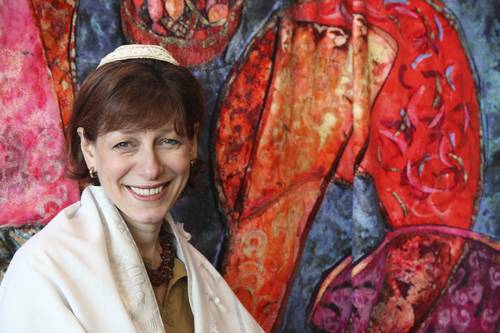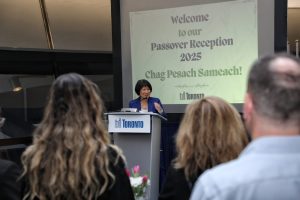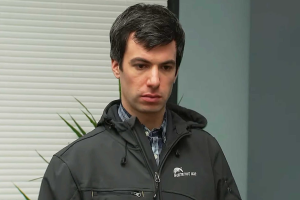In my childhood memory I lean into her full Ukrainian breast. I play with Raya Golub’s necklace. It is made of amber, a stone of an ancient sap that captured in its tear—a twig, a leaf, an insect and even me. In the last four weeks of this ugly war (and all wars are ugly) I have been asked to speak about Ukraine. I am not an expert in Ukrainian history, politics, economics or a scholar of Ukraine culture and literature. I am a Jew, who along with 50,000 other Jews, ran for freedom from Soviet Ukraine in 1979.
I have profound, etched memories of antisemitism, and the shame of being a Jew. I remember my ignorance and whispers of Yiddish phrases in my house growing up. I remember a scene on the bus when my grandmother switched into Yiddish when she saw an old neighbour. And I was mortified when a Ukrainian woman yelled “go to Israel if you want to speak Jewish.”
But for every painful memory I have of my life in Kyiv, I have hundreds of beautiful, soulful and sustaining ones of the warmth of my upbringing, my home and its people; Jews, Ukrainians and Russians who lived shoulder to shoulder in the city of my birth, Kyiv.
I am that creature that speaks to you from the amber sap. I am captured there, but my dreams and wonderful life in North American democracy, allow me to look back with generosity and depth of spirit.
I recall her legs that resemble two large pillars in front of the stove. Her wide hips move softly from place to place as she mixes and stirs a huge pot of soup and sharkoe (meat stew). She makes lunch for 70 or so hungry little souls who spend their long days in the childcare.
Raya Golub was the cook in the early childhood centre where I spent my days. I was taken there when I was six months old where my mother worked as an early childhood educator. My mother and Raya were good friends. They spoke Ukrainian. When it is time for us to leave Kyiv in the spring of 1979, Raya comes to our empty apartment and holds my mother for a long time as the two women say goodbye.
After that, from the New World, my mother will send Raya money every Ukrainian Christmas. They write to one another—about children, high blood pressure and varicose veins. After my mother’s death, my father makes the painful phone call to Raya, who cries and takes sweet breads to her Ukrainian church and lights a candle for my mother.

In 2013, a group of 20 members from our Toronto Reconstructionist synagogue, Darchei Noam, travelled with me to Russia and Ukraine. We visited Jewish sites, museums galleries and monuments. We cried together at Babi Yar, we walked the streets where my mother and father fell in love and where my grandmother taught me to love theatre and ballet.
Since Perestroika, Jewish institutions have begun to spring up throughout Ukraine—schools, Jewish cultural centres, synagogues and soup kitchens. Hidden Jews were finally able to ask about what it meant to be a Jew. Ukraine was a new democracy. I liked what I saw. I did not try to speak Jewish in public, however, I did ask for directions to Brodsky synagogue in the centre of Kyiv.
The building, beautifully reconstructed and housing a kosher restaurant, was reclaimed as a synagogue after serving for years as a Soviet children’s theatre. Facing the building to my left, a monument of Sholem Aleichem stood both modest and proud. There I unabashedly and confidently taught about him and other brilliant Jewish storytellers like the Baal Shem Tov and Nachum of Bratslav.
Our Ashkenazi Jewish culture is profoundly influenced by Ukrainian culture, music, kitchen and language. We have absorbed, developed and tailored it to our Jewish soul. It is impossible for me to tease out my Jewish identity from my Ukrainian experience, my life of being Kyivlynka (a girl from Kyiv).
In 1991, Ukraine proclaimed its independence and became an aspiring and inspiring democracy. Who would ever have thought that a Jewish boy who grew up in a Russian-speaking household would lift the hearts of others with his humour and wit and would make the finest Ukrainian president? At a recent UJA gathering, Alexandra Chyczij, president of the Ukrainian Canadian Congress, said to hundreds of Jews “Thank you for giving us President Zelenskyy.”
It would have been interesting to see what Nikolai Gogol, famous Ukrainian writer well known for his antisemitism, who nonetheless inspired Sholem Aleichem’s writing, and the woman on the bus who insulted my grandmother would say?
What I know is this: Israel is the first country to set up a field hospital in Ukraine and UJA Federation of Toronto is working tirelessly on the refugee efforts at the Ukrainian-Polish border. JIAS is gearing up to receive and assist thousands of homeless, desperate Ukrainian people.
As a Jew from Kyiv, I cannot separate myself from the Ukrainian reality. Not in the past and not today. When the bombs fall, they fall on Jews and Ukrainians alike.
Tina Grimberg was born in Kyiv, Ukraine, and moved to the United States when she was 16. She has been the rabbi at Toronto’s Darchei Noam Congregation since 2002, Her book, Out of Line: Growing up Soviet, was published in 2007.







